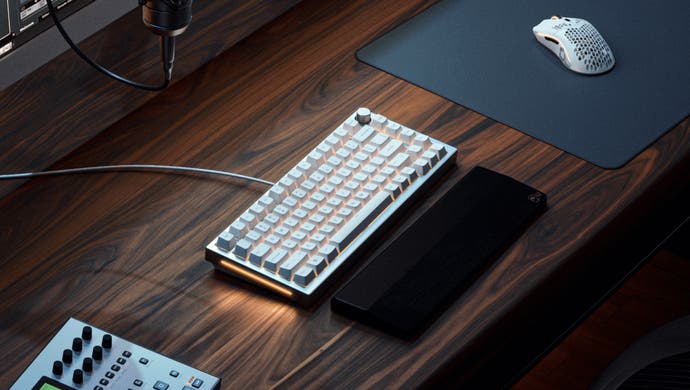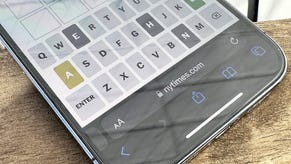Best 75% mechanical keyboards for gaming and typing 2024
Based on hundreds of hours of testing.
75 percent mechanical keyboards are a popular emerging category, offering nearly as many keys as a tenkeyless (no numpad) keyboard in a much more compact footprint. If you prefer a smaller keyboard, for ergonomics, portability or just aesthetics, but you can't live without the arrow keys and Function row that's necessarily excised on even the best 60 percent and 65 percent size keyboards, then 75 percent could be just right.
In this article, we'll share our absolute favourite 75 percent mechanical keyboards. After hundreds of hours of research, building and testing, we've narrowed down dozens of the best mechanical keyboards to just nine recommendations that we're confident will be great choices for gaming, typing, programming and more - including both wired and wireless options that work on Mac and PC.
To check out our selections, click on the keyboard you're interested in the list below or simply scroll on!
Best 75% mechanical keyboards
- Glorious GMMK Pro: handsome, customisable, impeccably built
- Keychron K2: compact, cheap, capable
- NZXT Function 2 MiniTKL: upgraded optical switches in a uniquely feature-dense design
- Gamakay TK75 HE: a great, sub-$100 rapid trigger keyboard
- Melgeek Mojo84: unique looks and a great typing experience
- Niz Plum Micro84: soft electro-capacitive switches
- Royal Kludge RK84: wired/wireless with hot swap switches
- Lofree Edge: extremely low profile with Bluetooth
- Logitech MX Keys Mini: quiet non-mechanical quality
- Asus ROG Azoth: A mainstream choices that bridges the gap
- Nerdytec Cykey: a few steps from greatness
1. Glorious GMMK Pro
A handsome, customisable and impeccably built keyboard
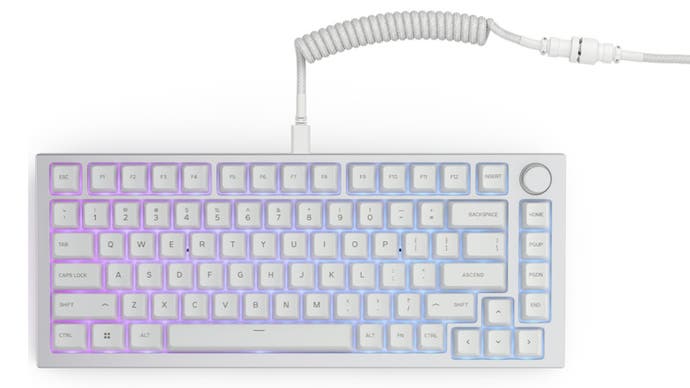
The Glorious GMMK Pro is a magnificent keyboard, but one that requires a bit of fitting together. Luckily, the skill required is far more "LEGO" than it is "jet engine" or even "computer" - you'll just need to push in switches into the bare board and then press keycaps onto the switches. Glorious were kind enough to send over a full spread, including keycaps, their impressively tactile 'Panda' switches and a fancy curled USB cable, but you should be able to use pretty much any Cherry MX-style switch in these hot-swappable sockets so you have a great degree of control over how the keyboard feels to use.
Whichever switches and keycaps you choose, the solid aluminium case, clipped and lubed stabilisers, gasket-mounted plate and fancy rotary encoder (aka programmable knob*) make for an outstanding first impression. The keyboard is fully customisable in software, from its RGB back-and-side lighting to its key bindings, which can be done in the Glorious Core software or programs like QMK Toolbox if open-source QMK firmware is installed. Installing this firmware also reduces input latency significantly (RTings measured 10ms vs 26ms), but means that RGB backlighting is disabled, which is a shame. This issue should be solvable in future, either by adding RGB to the QMK firmware or reducing the input latency of the default firmware, but right now it's the only issue with the board worth mentioning - and for what it's worth, I didn't notice any difficulties using the keyboard for gaming.
The GMMK Pro is a tantalising prospect, bringing the nerdy fun of custom mechanical keyboards to a wider audience and delivering an absolutely outstanding typing experience out of the box. If its few firmware issues can be solved, Glorious will have created what for many people is the perfect 75 percent keyboard.
*Coincidentally, also my university nickname.
Buy:
2. Keychron K2 / K3
Compact, cheap, capable
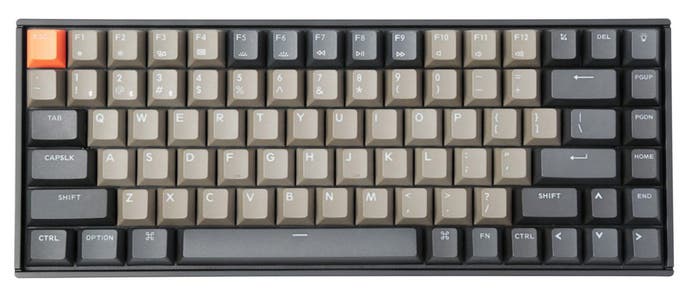
The Keychron K2 sets an incredibly high bar when it comes to value, offering a well-built keyboard with plenty of switch and backlight options at a very attractive price. It comes with Mac and Windows keycaps in the box, including a Mac-style Function row, which makes it almost uniquely Mac-friendly while still working just fine on Windows and Linux computers. The default K2 comes with Gateron Red, Blue or Brown switches, a plastic frame and a white key backlighting, but you can spend a little more to get RGB backlighting or RGB backlighting with an aluminium frame. Even for the most expensive option, you're still getting a great deal.
The ($74) Keychron K3 is also worth mentioning. This keyboard is even lighter and more portable than the K2, swapping out full-height mechanical switches for low profile Gateron or Keychron Optical alternatives. This provides a snappy, laptop-like feel that I really adore. For more on the K3, check out our write-up here - including other great gaming keyboards of all sizes.
Buy:
3. NZXT Function 2 MiniTKL
Newly upgraded optical switches in a uniquely feature-dense design
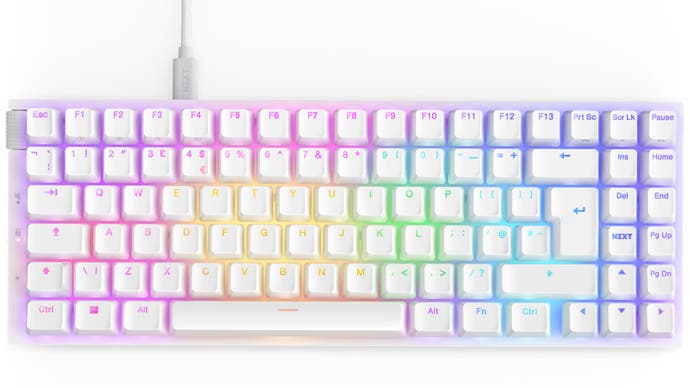
The Function 2 MiniTKL is an evolution of the PC case maker's initial compact keyboard that upgrades to optical switches for faster inputs and a range of actuation depths. I'm glad to see that the original version's uniquely key-dense design is maintained, which even includes a volume wheel and three mode keys on the left side of the chassis. I think this area is easier to reach than the traditional upper right placement for volume wheels and means you don't have to take your hand off the mouse to mute or adjust the volume - clever stuff for competitively-minded players.
Outside of this, the keyboard is good-looking and performant, with a new 8000Hz polling rate that matches high-end keyboards from the likes of Corsair and Razer, plenty of RGB lighting (set via NZXT's CAM software) and a choice of US or UK layouts in black and white colourways.
The non-standard layout on the right side does mean that finding custom keycap sets could be tricky, but the switch to premium PBT keycaps compared to the ABS of the original model makes a huge difference to key feel and overall build quality - I wouldn't feel any need to change these unless I wanted a particular colour scheme.
Overall, an excellent follow-up from NZXT that's well worth checking out alongside their larger Function 2 which leads our current round-up of the best full-size mechanical keyboards.
Buy:
4. Gamakay TK75 HE
A great, sub-$100 rapid trigger keyboard
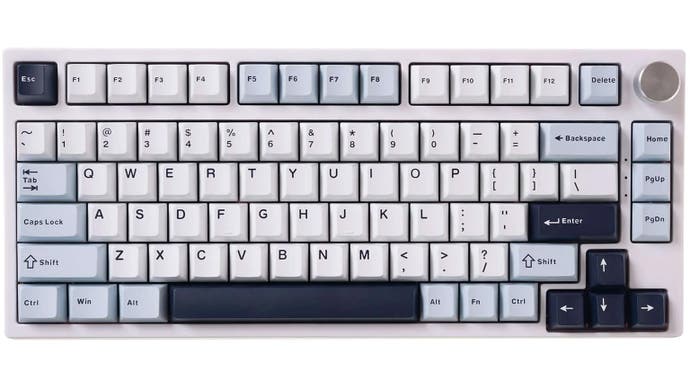
The Gamakay TK75 HE has quickly become my go-to keyboard recommendation for Counter-Strike 2 and other fast-paced competitive games, thanks to the keyboard's exceedingly rapid Hall Effect switches, comfortable compact layout and aggressive sub-$100 price point.
Those Hall Effect switches allow for a rapid trigger function which essentially allows you to press and release a key at any point in its travel, rather than having to reach a fixed actuation point. That makes stopping on a dime to deliver an accurate headshot much faster and easier, and we've seen this technology spread from its originators Wooting to more mainstream brands like Corsair, SteelSeries and Razer in the last year or so. The TK75 HE is by far the cheapest option with the same tech, making it a good choice for the value-oriented FPS gamer.
Apart from this rarely-so-affordable functionality, the TK75 HE also comes with a convenient metal volume knob in the upper right and tri-mode wired, Bluetooth and 2.4GHz wireless connectivity. The case is plastic, but feels well-built and weighty, while the white, black and grey PBT keycaps are not the most textured but still provide a more stable gaming platform than ABS alternatives, eg the more expensive Nerdytec keyboard recommended below. I found myself returning to the TK75 HE even for typing up articles like this one, which is always a good sign that I'm having a pleasant typing experience. I'm genuinely impressed.
Buy:
5. Melgeek Mojo84
A unique look and a brilliant typing experience
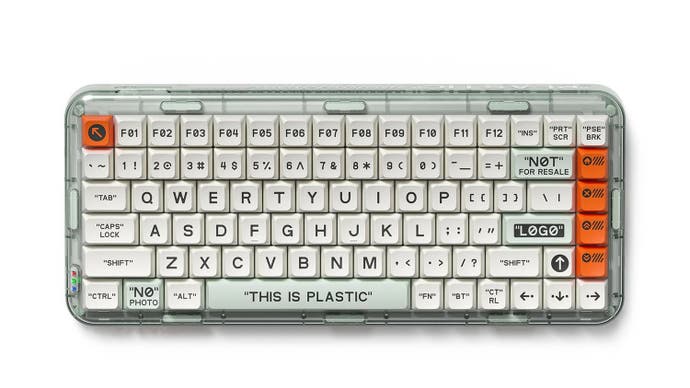
The Melgeek Mojo84 is an eye-catching pre-built mechanical keyboard with a transparent polycarbonate case that doesn't use any screws, unique double-shot ABS keycaps with bold legends and tri-mode connectivity (USB-C, 2.4GHz wireless and Bluetooth). It just looks cool sitting on a desk, though without backlit keycaps its RGB backlighting isn't very effective.
I absolutely love the look of this keyboard, but what really won me over is its feel. The Kailh Box Plastic switches are soft, linear switches that work well for gaming and typing alike, with a pleasantly deep report due to the gasket mount and plenty of added foam included here. The Mojo84 has small fixed rubber feet, but the MDA keycap profile does provide a natural curve so I didn't find the lack of adjustment an issue whatsoever.
The 84-key layout is tight and logical, though I did find having the delete key below the home key was unexpected. The keyboard can be rebound in the Melgeek Hive software, which is significantly more polished than I'd expect from a boutique keyboard maker - that's great to see.
Buy:
6. Niz Plum Micro84
Soft electro-capacitive (Topre-like) switches
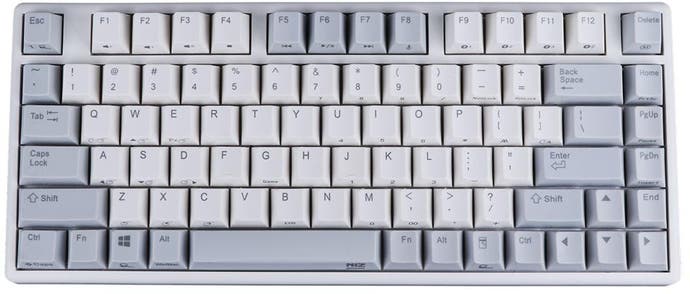
The Niz Micro84 (sometimes called the Plum Micro84) brings something unique to the table: electro-capacitive switches that combine the soft feel of rubber dome keyboards with the accuracy and durability of mechanical keyboards. You may have tried (or heard about) these sorts of switches on boards like the Topre Realforce or Happy Hacking Keyboard (HHKB), which are well known for their soft and pleasant typing feel. Of course, those examples are both incredibly expensive, but the Micro84 is a lot more reasonably priced.
Asides from its unique switches, the Micro84 impresses with its long feature list. This is a Bluetooth keyboard that can also be used wired, it comes with numerous backlighting options from no backlighting to full RGB, and it has an incredible number of functions accessible through the Fn layer. This makes for a slightly busy-looking keyboard, with tons of legends on each keycap, but it means you really don't miss out on anything - there are controls for the mouse, volume, media, backlighting, numpad, Bluetooth connections and much more.
All things considered, the Micro84 is a unique keyboard that's well worth experiencing, especially for typing and programming, even though its unique switches and lack of customisable firmware mean that your options for post-purchase customisation are limited.
Buy:
7. Royal Kludge RK84
A good wired/wireless budget option with hot-swap switches

The Royal Kludge RK84 is one of the most affordable wired and wireless keyboards of this size, offering a compact layout that nonetheless includes all of the keys often left out of smaller designs. The RK84 doesn't do anything daring in terms of its design or features, but it feels solidly built in the hand, exhibiting no deck flex, and looks clean. Keycap legends are a common stumbling block for budget designs, but here the font used is sensible, with alternative functions shown in white below the backlit primary legends. The RGB backlighting can be adjusted or disabled without installing software, and other functions like volume and media controls, shortcuts and Function lock work as advertised too.
My favourite feature of this keyboard are its switch options, which in addition to the usual soft linear and tactile (MX Red and MX Brown, respectively), include a clicky MX Blue switch. The board is also hot-swappable, so you can remove the RK-branded switches and replace them with any other three-pin design. In terms of connectivity, USB is supported (with a two port hub, even!) as well as Bluetooth and 2.4GHz wireless (via a USB dongle). This makes it easy to connect to a wide range of devices, while the 3750mAh battery provides months of use with RGB disabled (or weeks otherwise).
Overall, a great value keyboard - especially when bought direct from RK's store - and one that I'll keep around for mobile use in the future!
Buy:
8. Lofree Edge
An extremely low profile wired and Bluetooth keyboard
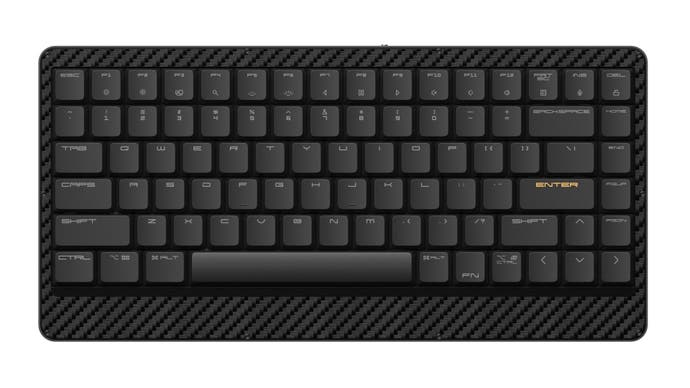
The Lofree Edge is an extremely slim 75 percent keyboard that is built around Kailh POM 2.0 low profile mechanical switches in a gasket mount, giving it a snappy, laptop-like feel with a deep sound signature that feels miles beyond most laptops.
The keyboard's wedge-shaped design ranges from 5.4 to 16.5mm, while weighing in at 485g. With both USB-C wired and Bluetooth connectivity, you have quite a bit of flexibility too; the Edge works well whether it's sat on a desktop, kept next to the couch for use with a media PC or tucked into a backpack to be used with your laptop or tablet on the go. I used it most often when sitting in a racing cockpit where there wasn't space for a regular keyboard, and the Edge worked perfectly in this role.
The layout here is quite standard and suits both Mac and Windows keymaps, with Fn shortcuts used to swap between them. (I'd have preferred a dedicated toggle switch, but after a few visits to the manual you'll commit Fn+N and Fn+W to memory.) The keys aren't particularly readable though, with a hairline font weight and white backlighting that bleeds around each PBT keycap rather than illuminating the lettering from behind. This isn't likely to be an issue for frequent typists, but if you're going to have backlighting at all I feel you may as well spring for compatible keycaps. That backlighting has a large impact on battery life too, with 10 hours promised with backlighting and 130 hours with it disabled from a 2000mAh battery - so I'd definitely recommend you keep the lighting off, especially given a relatively long three-hour charging time.
Interestingly, the Edge comes with a carbon fibre stand that slots together from multiple pieces, allowing you to a place to stash either the keyboard or a tablet - but it's too narrow for a smartphone, which feels like a missed opportunity. By default, the Edge feels comfortable to use flat, but there are 3° and 6° flip-out feet to adust its orientation if you prefer.
We normally don't recommend Kickstarter projects amongst our guides, but Lofree have a good track record for delivering their keyboards to a reasonable time scale and the unit we tested feels like the finished article, so we're happy to recommend it. For anyone that prefers low-profile, laptop-like keyboards, this is a seriously nice piece of kit.
Buy:
9. Logitech MX Keys Mini
A quiet non-mechanical keyboard of real quality
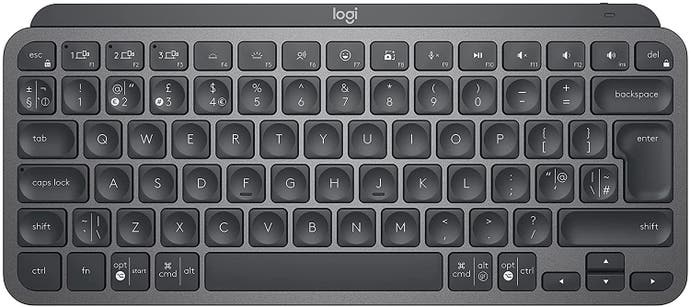
The Logitech MX Keys Mini is a smartly presented scissor switch (ie non-mechanical) keyboard that is worth considering alongside mechanical options. It offers contoured low profile keys with white backlighting and a compact layout that includes a few unique hotkeys, like buttons for emojis and screenshots. For gaming, the Keys Mini works surprisingly well, with the short travel making it easy to input rapid double-taps. It's also quite a quiet keyboard, which makes it a good choice for use in a shared space or crowded office. This is a Bluetooth keyboard, so you could also easily tuck the MX Keys Mini into your bag to use on public transport with a phone or tablet.
The only downside to the MX Keys Mini is that it doesn't come with a 2.4GHz wireless dongle, nor does it work with Logitech's Unifying Receiver, nor can it be connected via USB. It is compatible with another Logitech dongle, the Logi Bolt, but this must be purchased separately at a cost of £11/$15. It's disappointing to see a cheap low-latency option not being available for a keyboard of this price point, even if gaming isn't the keyboard's intended market. The full-size MX Keys keyboard does come with a USB receiver, so this is a disappointing omission as not all computers offer strong Bluetooth connections, although most with Wi-Fi do at least include it.
If you're looking for a keyboard that's quieter, slimmer and classier than most mechanical gaming keyboards, the MX Keys Mini is a reasonable choice. I particularly like it for use with a media PC, where its small size and Bluetooth connection make a lot of sense, or for a better typing experience with a laptop.
Buy:
10. Asus ROG Azoth
A mainstream choices that bridges the gap
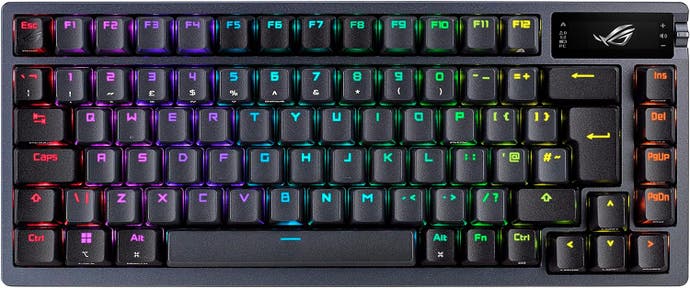
The Asus ROG Azoth is a keyboard that took the mechanical world by storm when it was released, marking a rare instance of a mainstream manufacturer going all-in on the custom keyboard scene. Asus bundled in all manner of creature comforts including pre-lubricated switches, gasket mounting and hot-swappable sockets to appeal to the enthusiast crowd. Its execution is sublime, with smooth linear NX Red switches and a comfortable typing experience.
The Azoth also has typical gaming keyboard flair, with mean looks and an unconventional OLED screen, which we've seen other manufacturers use in the past, so it's nice to see Asus bundle one here. Its battery life of up to 2000 hours in the best case scenario with no RGB on and over the 2.4GHz wireless receiver is also excellent, while it can also connect over Bluetooth. Its software isn't the best, but that's a small problem in the context of what is a fantastic mainstream gaming keyboard with lots of enthusiast-level features.
Of course, the hard thing to stomach with the Azoth is the price. It's an expensive option undoubtedly, but it's worth considering that some fully custom enthusiast-level options can run a lot more, and sometimes come with less features!
Buy:
11. Nerdytec Cykey
A few steps from greatness
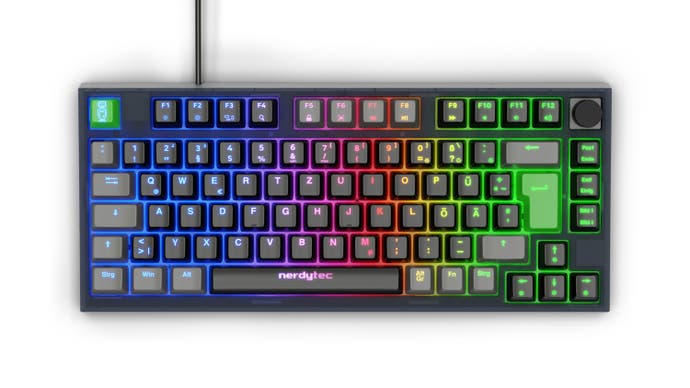
The Nerdytec Cykey is a fascinating keyboard that just misses out on a better spot in our rankings despite delivering some great features and design traits.
Let's cover the basics first: you get a fairly standard compact layout with a rotary encoder in the upper right for volume control, a function layer for additional controls and a combination of ABS keycaps on top of soft linear Gateron G Pro 3.0 yellow mechanical switches. Inside, QMK/VIA support allow for reprogramming, and you can press Fn+6 or Fn+7 to swap between Windows and Mac modes. These are all nice features, but I do feel a little let down with the slippery keycaps and slightly rattly key presses at this price.
The Cykey shows signs of thoughtful design, with the USB cable connecting in a large recessed area that allows room for both chunkier third-party cables and a QR code that guides you to a support site; the cable can be routed to three different areas and the keyboard's feet also offer three levels of angle adjustment. I also like the chassis, which is semi-transparent and looks great with its default green backlight - full RGB is of course onboard so other colours and effects are also available.
Ultimately, the Nerdytec Cykey isn't a bad keyboard, but it doesn't have a unique selling point that really sets it apart from other options in its price class.
Buy:
So there we have it - our top ten choices. Let us know what you think in the comments below, and if you think we've missed out a great contender then do get in touch! You can also reach me via Twitter @wsjudd if you prefer.
